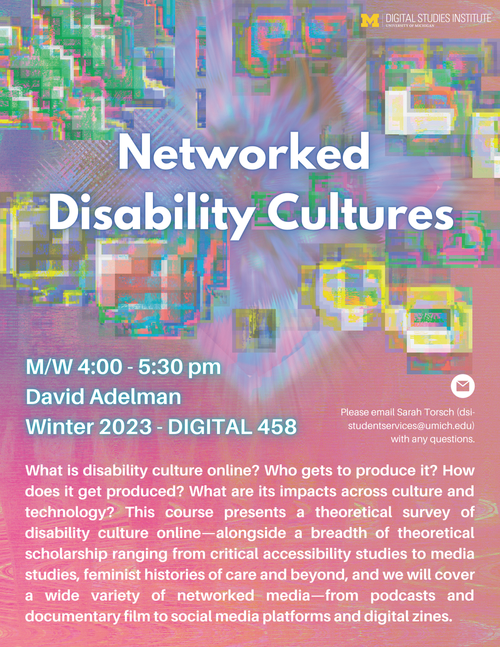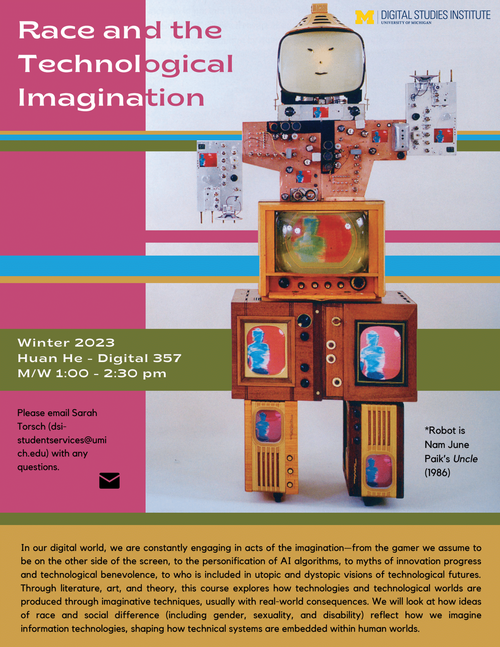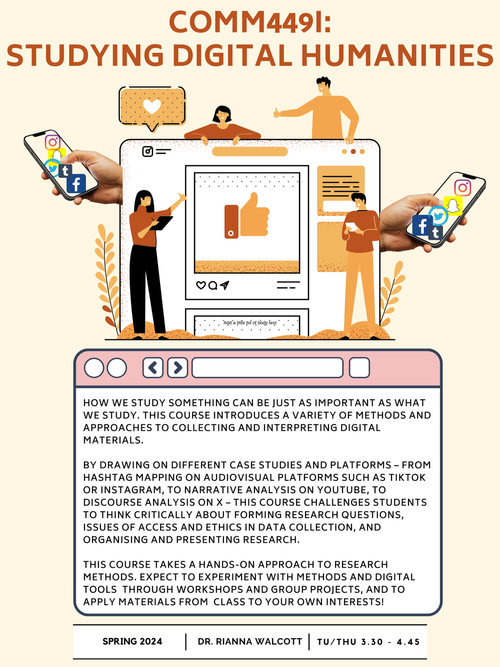
DISCO Courses
The DISCO Network is a collective of educators who use their research as a critical lens through which students learn about the past and present of digital technology to brainstorm more equitable futures. DISCO courses are interdisciplinary and multimodal: they span five university campuses and are cross-listed with departments as wide-ranging as Communication, English, Film and Media Studies, Art and Design, and American Studies. Because of their extensive reach, our classes draw students from across the humanities, social sciences, arts, and STEM fields at both the undergraduate and graduate levels, many of whom are eager to take what they’re learning and put it into practice within and beyond academia. From trolling and disinformation; how users perform and experience disability online; light-skin bias in color technologies; and the historical entanglements of sneakers and Black bodies, DISCO classes explore how racism, ableism, and sexism are built into the digital infrastructures and discourses that surround us and invite students to imagine alternative possibilities.
DISCO courses also stand out not just for what subjects they tackle, but for how they’re taught. Our faculty make anti-racist pedagogy and accessibility a priority in both virtual and physical classroom spaces. In doing so, we model to our students what a more equitable and accessible classroom community can look like. Many of our assignments are creative or break the mold of the traditional essay format. Whether students are designing a parody of Pantone’s Color of the Year that offers a critique of a cultural phenomenon, writing a love letter to a media object, or keeping a “BS-log” of obfuscating rhetoric they encounter online, these endeavors push them to think differently about the world through experimentation, critical media literacy, and play.
DISCO courses make it clear that race, disability, and sexuality are not “special topics” added on to a larger syllabus structure. Questions of ethics, justice, and power are at the core of how digital technology has shaped our understanding of the world and ourselves—and in turn, who gets to be considered “human.”
Kevin Winstead's Video Series
-

Technoskepticism: An Interview With the Author
In this conversation, Rianna Walcott and Kevin Winstead discuss the possibilities and limitations of the relationship between AI and Blackness.
-

A Conversation between Kevin Winstead, Ph.D., Rev. Joseph A. Brown, Ph.D., and Andre Brock, PhD
In this video, we have a conversation about the African, the African American, and modernity in Western Technoculture.
-

Distributed Blackness: A Conversation With the Author
In this video, Brock and Winstead explore concepts and conversations from throughout the class, including the concepts of love, joy, sugar cane mill, jouissance, and libidinal economy.
Previous Course Fliers
DISCO's 2024-2025 Courses
-
Black Digital Humanities
Taught by Kevin Winstead, this class will seek to prepare the next generation of digital humanists and African-American scholars by broadening the conversation around new theories, methods, and tools to explore African-American art, labor, and migration. Through readings and various projects, the class will familiarize themselves with the concepts, tools, and debates of and within the intersection of Digital Humanities and Black Studies.
-
Black Digital Studies
Taught by Kevin Winstead, this class will seek to prepare the next generation of digital humanists and African-American scholars by broadening the conversation around new theories, methods, and tools to explore African-American art, labor, and migration. Through readings and various projects, the class will familiarize themselves with the concepts, tools, and debates of and within the intersection of Digital Humanities and Black Studies.
-
Black Discourse in Digital Communication
Taught by Rianna Walcott, this course explores the history of Black discourse and orality and how the unique communicative traditions of African diasporic people in the U.S. were formed in relation to technological skill. Students investigate the different mechanisms by which communication researchers can study Black users and discourse with a specific emphasis on critical cultural studies methods and digital humanities tools.
-
Critical A.I.
Taught by Lisa Nakamura, this class is an advanced introduction to the field of critical A.I. studies, tracing the history of A.I. through Turing Tests and chatbots to our contemporary moment.
DISCO's 2023-2024 Courses
-
Advanced Critical and Historical Methods: Media and Digital Communication
Taught by Catherine Knight Steele, this course served as an advanced seminar in critical methods as applied to media and digital studies. This included analyses of both text and platform. Through careful analysis and play the class considered how the digital humanities allows us to ask new questions in new ways.
-
Black Social Movements, The Internet, and Social Media
Taught by Kevin Winstead, this course engaged with conceptual and empirical understandings of the interaction between new media and social change. It explored cases from the previous twenty years - primarily focusing on African American culture and cyberactivism - using the public sphere and third spaces as a conceptual framework.
-
From Prisms to Pantone: Color, Race, and Technology
Taught by Lida Zeitlin-Wu, this course took a deep dive into the rich, fascinating, and sometimes overwhelming topic of color as it is mediated by technology, culture, and politics. By doing so, the class opened up a larger conversation about how technology shapes our perception of the world and ourselves.
-
Introduction to Digital Studies in the Arts and Humanities
Taught by Catherine Knight Steele, this class thought through the histories of digital technology, situating them within the cultural and social contexts in which they emerge. With this introduction, students determined which digital tools and methods were most appropriate for their research.
-
Networked Disability Cultures
Taught by David Adelman, this course presented a theoretical survey of online environments and infrastructures, covering a wide variety of networked media-from podcasts and documentary film to social media platforms and digital zines. The quarter culminated in a collaborate project that invites our class to critically and creatively reflect on local histories of access, technology, and disability culture.
(Note: David Adelman’s effort for this course in Winter 2024 was partially funded by the Mozilla Foundation)
-
Race, Gender, and Digital Media
Taught by Brandy Pettijohn, this course examined how race and gender identity are mediated in digital media. The class explored issues of race, ethnicity, and gender + the politics of technology (technoculture) in digital venues, social media, artificial intelligence, algorithms, and mundane digital phenomena.
-
Race, Gender, Sexuality, and U.S. Culture in Video Games
Taught by Toni Bushner, this course offered a deep dive on the fascinating intersections of race and gender with interactive media. The class began with an exploration of the queer experience of failure and its use as an interactive metaphor for passing. Next, they explored the role of representation and embodiment in interactive media: from depictions of the “other” in games like Fallout and Fable to the connections between orientalism and the foundations of game studies to the at-hand nature of colonialist narratives in games, they explored the intersection of race and interactive media. The semester ended with a discussion on game industry labor issues, gaming culture’s problem with harassment (ala Gamergate & its connections to the alt-right movement), and a brief look at game accessibility.
-
Race, Technology, and Information
Taught by Rayvon Fouché, this course engaged scholarship that traverses studies of race and difference, technology and science, and a variety of information systems and platforms. The objective was to develop a scholarly foundation of the literatures relevant to the ways racially marginalized communities experience, navigate, and inhabit information infrastructures.
-
Social Media
Taught by André Brock, this course encouraged students to read and interpret media artifacts through a variety of theoretical lenses anchored in both the form and content of a text with a critical approach to understanding embedded meanings, motivations, and representations in networked media.
-
Studying Digital Humanities
Taught by Rianna Walcott, this course introduced a variety of methods and approaches to collecting and interpreting digital materials, with a focus on qualitative methods. The class considered the ethical implications of conducting digital research, explored methods that are adaptive to the constant shift in digital terrain, and experimented with different ways of interpreting and presenting findings.
-
Theories of Black America (Science, Technology, and Race)
Taught by Kevin Winstead, this course took a critical look at the ways race and gender shape the uses and design of information and communication technologies (ICTs). Beginning from the understanding that ICTs have become part of our social infrastructure, the readings for this course were selected to encourage reflection on how information technologies are mediated by culture; that is, how everyday digital interactions are configured or approached by racial groups, with men, and with women.
DISCO's 2022-2023 Courses
-
Black Discourse and Digital Communication
Taught by Rianna Walcott, this course explored the history of Black discourse and orality and how the unique communicative traditions of African diasporic people in the U.S. were formed in relation to technological skill. In this process, the class discussed how the parallel development of racism and Black cultural traditions have equipped Black users to wield digital technology skills in ways that often outpace and differ from the dominant group.
-
Black Discourse and Digital Media
Taught by Catherine Knight Steele, this course explored the history of Black discourse and orality and how the unique communicative traditions of African diasporic people in the U.S. were formed in relation to technological skill. In this process, the class discussed how the parallel development of racism and Black cultural traditions have equipped Black users to wield digital technology skills in ways that often outpace and differ from the dominant group.
-
Contemporary Issues in American Studies
Taught by Aaron Dial, this course sat with and in important and historical conversations within the field. However, and inevitably, this course left out so much more. These interdisciplinary works span a cross section of relevant themes, ideas, and concepts within Black Studies and, by proxy, American Studies as well. The predominant goal of this course was to assist students in fine tuning their interests and developing a coherent conceptual network that helped shape their current and future research agenda.
-
Deadstock: Sneakers and the Politics of Material Culture
Taught by Aaron Dial, this course explored how sneakers exist as cultural talismans fomenting new understandings of modern material culture and the vulnerability and reliability of certain bodies therewithin. Over the course of a semester, students interrogated the complicated and always political of sneakers as a thing which simultaneously heralds capitalism’s demand for a specific brand of global pluralism while also representing more insular and regional identity formations.
-
Feeling Digital
Taught by Jeff Nagy, this class looked at digital systems not just as information technologies, but as emotional ones. It investigated how they came to serve as the habitat for age-old feelings like joy, sadness, and shame. And the class asked how they might be prompting new ones, glimpsed as we doomscroll through the news or watch the floating dots disappear in a text thread with a friend.
-
From Prisms to Pantone: Color, Race, and Technology
Taught by Lida Zeitlin-Wu, this course took a deep dive into the rich, fascinating, and sometimes overwhelming topic of color as it is mediated by technology, culture, and politics. By doing so, the class opened up a larger conversation about how technology shapes our perception of the world and ourselves.
-
Historical Approaches to (Digital) Media Studies
Taught by André Brock, this required doctoral course for Georgia Tech’s Digital Media PhD was updated to incorporate badly needed resources on new media and digital media including method, theory, technologies, and phenomena from a critical race theory standpoint.
-
Media Theory
Taught by Catherine Knight Steele, this course provided students with an introduction to media theory from multiple perspectives. Through readings, lectures, discussions, and case studies, students understood how technical, historical, economic, social, and political forces have helped shape media content and the media themselves.
-
Networked Disability Cultures
Taught by David Adelman, this course presented a theoretical survey of online environments and infrastructures, covering a wide variety of networked media-from podcasts and documentary film to social media platforms and digital zines. The quarter culminated in a collaborative project that invites our class to critically and creatively reflect on local histories of access, technology, and disability culture.
-
Race, Gender, Sexuality, and U.S. Culture in Video Games
Taught by Toni Bushner, this course offered a deep dive on the fascinating intersections of race and gender with interactive media. The class began with an exploration of the queer experience of failure and its use as an interactive metaphor for passing. Next, they explored the role of representation and embodiment in interactive media: from depictions of the “other” in games like Fallout and Fable to the connections between orientalism and the foundations of game studies to the at-hand nature of colonialist narratives in games, they explored the intersection of race and interactive media. The semester ended with a discussion on game industry labor issues, gaming culture’s problem with harassment (ala Gamergate & its connections to the alt-right movement), and a brief look at game accessibility.
-
Race and the Technological Imagination
Taught by Huan He, this course drew from literary, artistic, and theoretical texts, to examine how technologies and technological worlds are produced through imaginative techniques, often with real-world consequences. This course examined how ideas of race and social difference (including gender, sexuality, and disability) reflect how we imagine information technologies, shaping how technical systems are embedded within human worlds.
-
Science, Technology, and Race
Taught by Kevin Winstead, this course took a critical look at the ways race and gender shape the uses and design of information and communication technologies (ICTs). Beginning from the understanding that ICTs have become part of our social infrastructure, the readings for this course have been selected to encourage reflection on how information technologies are mediated by culture; that is, how everyday digital interactions are configured or approached by racial groups, with men, and with women.
-
Social Media
Taught by André Brock, this course encouraged students to read and interpret media artifacts through a variety of theoretical lenses anchored in both the form and content of a text with a critical approach to understanding embedded meanings, motivations, and representations in networked media.
-
Topics of Black Media: Black Social Movements, The Internet, and Social Media
Taught by Kevin Winstead, this course engaged with conceptual and empirical understandings of the interaction between new media and social change. It explored cases from the previous twenty years - primarily focusing on African American culture and cyberactivism - using the public sphere and third spaces as a conceptual framework.
DISCO's 2021-2022 Courses
-
Bullshit and Digital Rhetoric
Taught by Remi Yergeau, this class examined the theory and practice of bullshit as it relates to digital rhetoric and online circulation. Among other questions, the course considered how and where manipulation, truth, and ethos mediate what we popularly describe or understand as bullshit.
-
Digital Media Theory
Taught by Lisa Nakamura, this course provided a comprehensive introduction to the major themes and issues in Digital Media Theory. Drawing on scholarship in material and cultural histories of computing, media archaeology, software and platform studies, race/ethnicity/gender and digital culture, post-Marxian theory, digital media analysis, transnational and memetic digital practice, the course mixed theoretical material with more empirically oriented studies.
-
Digital Rhetoric in Health and Medicine
Taught by Remi Yergeau, this class examined classical rhetorical concepts (such as phronesis/practical wisdom, aretê/virtue, and eunoia/goodwill) against broader formations and understandings of digital rhetoric — and with it, rhetorics of health, disability, and medicine — as a field. Their conversations worked to unpack and dismantle rhetorical studies's historical and contemporary representations of suasive discourse, technologization, and embodiment.
-
Introduction to Digital Media Studies and Computational Media
Taught by André Brock, this introductory course for Georgia Tech’s Computational Media Bachelor of Science degree was updated to include digital media studies resources including method, theory, and phenomena from a critical race theory standpoint.
-
Introduction to Digital Studies in the Arts and Humanities
Taught by Catherine Knight Steele, this class thought through the histories of digital technology, situating them within the cultural and social contexts in which they emerge. With this introduction, students determined which digital tools and methods were most appropriate for their research.









